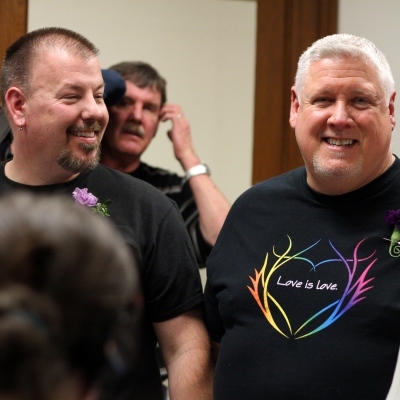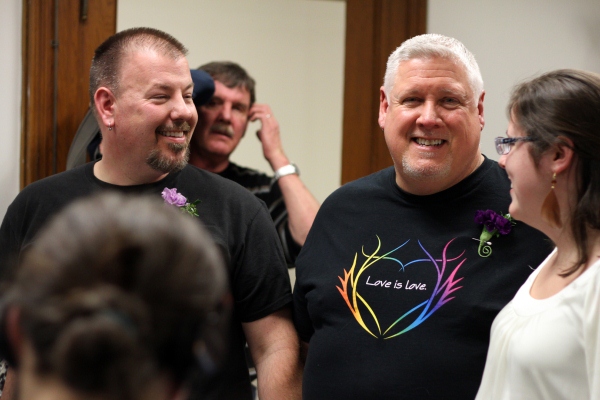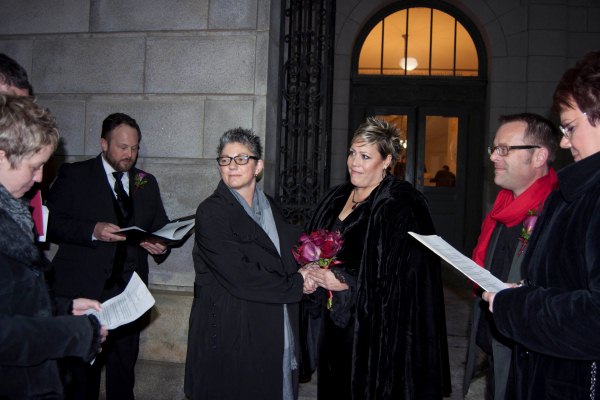National
Maine’s same-sex marriage law takes effect
Two Portland men became the first gay couple to marry in the state


Steven Bridges and Michael Snell exchanged vows inside Portland City Hall shortly after midnight on Dec. 29. (Photo by Kurt Graser/Knack Factory)
Michael Snell, 53, and Steven Bridges, 42, exchanged vows inside Portland City Hall shortly after midnight as Snell’s two daughters, Mayor Michael Brennan and several reporters watched. Hundreds of people who had gathered outside in sub-freezing temperatures cheered the men as they left the building — they even sang the Beetles song “All You Need Is Love” as Snell and Bridges and the more than dozen other same-sex couples who either exchanged vows or obtained marriage licenses walked down the stairs.
“It means equality,” Snell told documentarians with the Knack Factory moments after he and Bridges exchanged vows. “It means that our relationship, our marriage is equal to everybody else’s.”
The Portland City Clerk’s office remained open to any same-sex couple who wanted to apply for a marriage license or tie the knot until 3 a.m. The town clerk’s office in nearby Falmouth also opened at midnight for gays and lesbians who had already made appointments to get married.
The Portland-Press Herald reported South Portland City Clerk Susan Mooney issued marriage licenses to eight same-sex couples once her office — three of them tied the knot there — opened at 8 a.m. The Brunswick Town Clerk’s office also issued marriage licenses to gays and lesbians this morning.
Chris Kast and Byron Bartlett were among the same-sex couples who married at Portland City Hall after the law took effect.
They had a commitment ceremony two and a half years ago, but Kast told the Washington Blade earlier today their choice to get married after midnight was “a matter of fact decision on our part” to “go do it and be part of what was an amazing evening.”
“It felt incredible,” he said. “The energy was just all positive and joyful. It was amazing.”
Maine’s same-sex marriage law took effect after voters on Election Day approved it by a 52-48 percent margin. They repealed an identical statute in 2009 that then-Gov. John Baldacci signed earlier that year.
Same-sex marriage referenda in Maryland and Washington also passed on Nov. 6. Minnesotans on Election Day struck down a proposed state constitutional amendment that would have defined marriage as between a man and a woman.
“All the politics is done; now it’s just about actual couples and the people who have been together wanting to make it official,” Matt McTighe, campaign manager of Mainers United for Marriage, the group that supported the same-sex marriage referendum, told the Blade. He was among those who gathered outside Portland City Hall to celebrate the state’s first legal gay nuptials. “The energy was amazing. It was just nothing but happiness — take the best parts of every wedding you’ve ever been too and multiply it by a hundred and that’s what it was like for these people.”
Sue Estler and Paula Johnson, who have been together for 24 years, married in their Orono home on Saturday. The couple plans to have a larger celebration next summer, but Estler told the Blade just before she and Johnson exchanged vows they decided to marry on the first day same-sex couples in Maine can legally do so because “we’ve waited so long.”
“It’s historic in Maine,” she said. “We’ve had so many ups and downs and so forth. Our commitment has been long-term, and this formalizes it.”
Donna Galluzzo, who married her partner of three years, Lisa Gorney, at Portland City Hall earlier on Saturday, echoed Estler.
“We had a feeling the vote was going to pass this year,” Galluzzo told the Blade. “After the vote happened and once it was all signed into law and knew what day City Hall was going to open, we looked at each other and said ‘let’s do it.’ It was a historic day and was important for us to be a part of history.”
Kast agreed, describing the scene outside Portland City Hall after he and Bartlett exchanged vows as “surreal.”
“It has taken us so long to get here, to get to a place where everybody’s the same,” Kast said. “It was such a struggle and how no one should have to do that, no one should have to fight, no one should have to give money or knock on doors just to have the legal right to marry the person with whom they choose to spend the rest of their life with. But that aside, it was flippin’ amazing. It really was.”
National
Supreme Court deals blow to trans student privacy protections
Under this ruling, parents are entitled to be informed about their children’s gender identity at school, regardless of state protections for student privacy.

The Supreme Court on Monday blocked a California policy that allowed teachers to withhold information about a student’s gender identity from their parents.
The policy had permitted California students to explore their gender identity at school without that information automatically being disclosed to their parents. Now, educators in the state will be required to inform parents about developments related to a student’s gender identity, depending on how the case proceeds in lower courts.
The case involves two sets of parents — identified in court filings as John and Jane Poe and John and Jane Doe — both of which say their daughters began identifying as boys at school without their knowledge, citing religious objections to gender transitioning.
The Poes say they only learned about their daughter’s gender dysphoria after she attempted suicide in eighth grade and was hospitalized. After treatment for the attempt and after being returned to school the following year, teachers continued using a male name and pronouns despite the parents’ objections, citing California law. The Poes have since placed their daughter in therapy and psychiatric care.
Similarly, the Does say their daughter has intermittently identified as a boy since fifth grade, but while their daughter was in seventh grade, they confronted school administrators over concerns that staff were using a male name and pronouns without informing them. The principal told them state law barred disclosure without the child’s consent.
Both sets of parents filed lawsuits in the U.S. District Court for the Southern District of California challenging the state policy that protects students’ gender identity and limits when schools can disclose that information to parents.
The justices voted along ideological lines, with the court’s six conservative members in the majority and the three liberal justices dissenting.
“We conclude that the parents who seek religious exemptions are likely to succeed on the merits of their Free Exercise Clause claim,” the court said in an unsigned order. “The parents who assert a free exercise claim have sincere religious beliefs about sex and gender, and they feel a religious obligation to raise their children in accordance with those beliefs. California’s policies violate those beliefs.”
In dissent, the three liberal justices argued that the case is still working its way through the lower courts and that there was no need for the high court to intervene at this stage. Justice Elena Kagan wrote, “If nothing else, this Court owes it to a sovereign State to avoid throwing over its policies in a slapdash way, if the Court can provide normal procedures. And throwing over a State’s policy is what the Court does today.”
Conservative Justices Samuel Alito and Clarence Thomas indicated they would have gone further and granted broader relief to the parents and teachers challenging the policy.
The emergency appeal from a group of teachers and parents in California followed a decision from the United States Court of Appeals for the Ninth Circuit that allowed the state’s policy to remain in effect. The appeals court had paused an order from U.S. District Judge Roger Benitez — who was nominated by George W. Bush — that sided with the parents and teachers and put the policy on hold.
The legal challenge was backed by the Thomas More Society, which relied heavily on a decision last year in which the court’s conservative majority sided with a group of religious parents seeking to opt their elementary school children out of engaging with LGBTQ-themed books in the classroom.
California Attorney General Rob Bonta expressed disappointment with the ruling. “We remain committed to ensuring a safe, welcoming school environment for all students while respecting the crucial role parents play in students’ lives,” his office said in a statement.
The decision comes as the Trump administration has taken a hardline approach to transgender rights. During his State of the Union address last week, President Donald Trump referenced Sage Blair, who previously identified as transgender and later detransitioned, describing Blair’s experience transitioning in a public school. According to the president, school employees supported Blair’s chosen gender identity and did not initially inform Blair’s parents.

Last year, the court upheld Tennessee’s ban on gender-affirming medical care for transgender minors and has allowed enforcement of a policy barring transgender people from serving in the military to continue during Trump’s second term.

The Comings & Goings column is about sharing the professional successes of our community. We want to recognize those landing new jobs, new clients for their business, joining boards of organizations and other achievements. Please share your successes with us at [email protected].
Congratulations to Gil Pontes III on his recent appointment to the Financial Advisory Board for the City of Wilton Manors, Fla. Upon being appointed he said, “I’m honored to join the Financial Advisory Board for the City of Wilton Manors at such an important moment for our community. In my role as Executive Director of the NextGen Chamber of Commerce, I spend much of my time focused on economic growth, fiscal sustainability, and the long-term competitiveness of emerging business leaders. I look forward to bringing that perspective to Wilton Manors — helping ensure responsible stewardship of public resources while supporting a vibrant, inclusive local economy.”
Pontes is a nonprofit executive with years of development, operations, budget, management, and strategic planning experience in 501(c)(3), 501(c)(4), and political organizations. Pontes is currently executive director of NextGen, Chamber of Commerce. NextGen Chamber’s mission is to “empower emerging business leaders by generating insights, encouraging engagement, and nurturing leadership development to shape the future economy.” Prior to that he served as managing director of The Nora Project, and director of development also at The Nora Project. He has held a number of other positions including Major Gifts Officer, Thundermist Health Center, and has worked in both real estate and banking including as Business Solutions Adviser, Ironwood Financial. For three years he was a Selectman, Town of Berkley, Mass. In that role, he managed HR and general governance for town government. There were 200+ staff and 6,500 constituents. He balanced a $20,000,000 budget annually, established an Economic Development Committee, and hired the first town administrator.
Pontes earned his bachelor’s degree in political science from the University of Massachusetts, Dartmouth.
Kansas
ACLU sues Kansas over law invalidating trans residents’ IDs
A new Kansas bill requires transgender residents to have their driver’s licenses reflect their sex assigned at birth, invalidating current licenses.

Transgender people across Kansas received letters in the mail on Wednesday demanding the immediate surrender of their driver’s licenses following passage of one of the harshest transgender bathroom bans in the nation. Now the American Civil Liberties Union is filing a lawsuit to block the ban and protect transgender residents from what advocates describe as “sweeping” and “punitive” consequences.
Independent journalist Erin Reed broke the story Wednesday after lawmakers approved House Substitute for Senate Bill 244. In her reporting, Reed included a photo of the letter sent to transgender Kansans, requiring them to obtain a driver’s license that reflects their sex assigned at birth rather than the gender with which they identify.
According to the reporting, transgender Kansans must surrender their driver’s licenses and that their current credentials — regardless of expiration date — will be considered invalid upon the law’s publication. The move effectively nullifies previously issued identification documents, creating immediate uncertainty for those impacted.
House Substitute for Senate Bill 244 also stipulates that any transgender person caught driving without a valid license could face a class B misdemeanor, punishable by up to six months in jail and a $1,000 fine. That potential penalty adds a criminal dimension to what began as an administrative action. It also compounds the legal risks for transgender Kansans, as the state already requires county jails to house inmates according to sex assigned at birth — a policy that advocates say can place transgender detainees at heightened risk.
Beyond identification issues, SB 244 not only bans transgender people from using restrooms that match their gender identity in government buildings — including libraries, courthouses, state parks, hospitals, and interstate rest stops — with the possibility for criminal penalties, but also allows for what critics have described as a “bathroom bounty hunter” provision. The measure permits anyone who encounters a transgender person in a restroom — including potentially in private businesses — to sue them for large sums of money, dramatically expanding the scope of enforcement beyond government authorities.
The lawsuit challenging SB 244 was filed today in the District Court of Douglas County on behalf of anonymous plaintiffs Daniel Doe and Matthew Moe by the American Civil Liberties Union, the ACLU of Kansas, and Ballard Spahr LLP. The complaint argues that SB 244 violates the Kansas Constitution’s protections for personal autonomy, privacy, equality under the law, due process, and freedom of speech.
Additionally, the American Civil Liberties Union filed a temporary restraining order on behalf of the anonymous plaintiffs, arguing that the order — followed by a temporary injunction — is necessary to prevent the “irreparable harm” that would result from SB 244.
State Rep. Abi Boatman, a Wichita Democrat and the only transgender member of the Kansas Legislature, told the Kansas City Star on Wednesday that “persecution is the point.”
“This legislation is a direct attack on the dignity and humanity of transgender Kansans,” said Monica Bennett, legal director of the ACLU of Kansas. “It undermines our state’s strong constitutional protections against government overreach and persecution.”
“SB 244 is a cruel and craven threat to public safety all in the name of fostering fear, division, and paranoia,” said Harper Seldin, senior staff attorney for the ACLU’s LGBTQ & HIV Rights Project. “The invalidation of state-issued IDs threatens to out transgender people against their will every time they apply for a job, rent an apartment, or interact with police. Taken as a whole, SB 244 is a transparent attempt to deny transgender people autonomy over their own identities and push them out of public life altogether.”
“SB 244 presents a state-sanctioned attack on transgender people aimed at silencing, dehumanizing, and alienating Kansans whose gender identity does not conform to the state legislature’s preferences,” said Heather St. Clair, a Ballard Spahr litigator working on the case. “Ballard Spahr is committed to standing with the ACLU and the plaintiffs in fighting on behalf of transgender Kansans for a remedy against the injustices presented by SB 244, and is dedicated to protecting the constitutional rights jeopardized by this new law.”
-

 India5 days ago
India5 days agoActivists push for better counting of transgender Indians in 2026 Census
-

 Advice5 days ago
Advice5 days agoDry January has isolated me from my friends
-

 National5 days ago
National5 days agoAfter layoffs at Advocate, parent company acquires ‘Them’ from Conde Nast
-

 District of Columbia5 days ago
District of Columbia5 days agoCapital Pride reveals 2026 theme


















